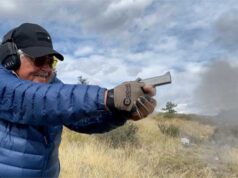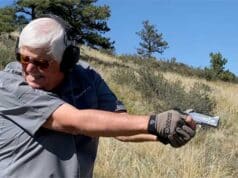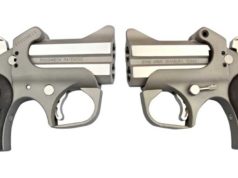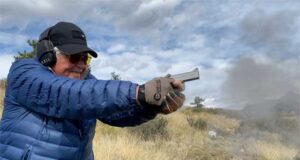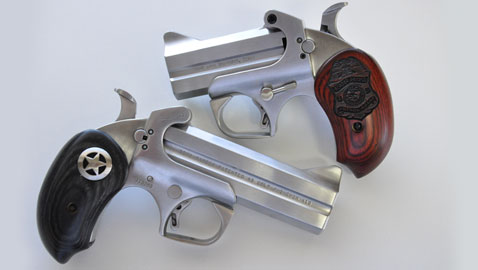 As we all know, John Wilkes Booth shot president Abraham Lincoln using a small, single shot percussion pistol known as a Philadelphia Deringer. So named because it was made by Henry Deringer Jr. of Philadelphia, Pennsylvania, that Deringer became the most infamous pistol in American history. Widely used and carried as personal defensive pistols of the time, the name Derringer, with two Rs, became a generic term for single and double-barreled pocket pistols made by Deringer and many others. Remington and Colt were among the manufacturers who produced rimfire and centerfire Derringers that became popular with gamblers and gunfighters, none more famous than Bill Hickok, who was said to carry numerous Derringers in his coat pockets.
As we all know, John Wilkes Booth shot president Abraham Lincoln using a small, single shot percussion pistol known as a Philadelphia Deringer. So named because it was made by Henry Deringer Jr. of Philadelphia, Pennsylvania, that Deringer became the most infamous pistol in American history. Widely used and carried as personal defensive pistols of the time, the name Derringer, with two Rs, became a generic term for single and double-barreled pocket pistols made by Deringer and many others. Remington and Colt were among the manufacturers who produced rimfire and centerfire Derringers that became popular with gamblers and gunfighters, none more famous than Bill Hickok, who was said to carry numerous Derringers in his coat pockets.
Because many Derringers were low powered, not particularly reliable and some were downright dangerous to handle, they fell out of favor for use as defensive pistols and became little more than curiosities during the better part of the 20th Century. That is, until Bond Arms came along and invented a stack barreled pistol made with modern materials in a wide range of calibers suitable for defense against everything from venomous snakes to equally venomous bad guys. During the recent NRA Annual Meeting in Nashville I had the opportunity to spend some time with Amy “Bond Girl” Graves and Gordon Bond, the company president, and I learned the Bond defensive pistols are very well made, of very high quality and are serious – deadly serious – defensive tools. Bond’s pistols are available in calibers from .22LR and .22 Magnum all the way up through the .410 shotgun round and .45 Colt. With the exception of the rimfire models, all the calibers are interchangeable on one frame, meaning you can buy additional barrel sets – shorter, longer or in different calibers – and install them on your frame by removing one hex head screw, swapping the barrels and replacing the screw. It really is that simple and Amy can demonstrate this much faster than I can explain it. Barrels are available in polished or matte finishes ranging from 2.5 inches to 4.25 inches and come in a choice of 13 calibers. Bond recently jumped through the hoops to get his pistols approved for sale in California and now has several California compliant models. As far as I can tell, Bond Arms pistols are available in every state but Massachusetts.
Other features include polished steel models with nicely laser engraved and embellished wood stocks, to more utilitarian models with rubber stocks and matte finishes. Models are available with and without removable trigger guards. There is a cross-bolt safety that can be locked, rendering the pistol unusable, and the rebounding hammer and transfer bar make the pistol safe to carry with loaded barrels. Bond Arms cautions that the pistols are NOT to be carried “cocked and locked”, that is with the hammer cocked and the safety on. The barrels fire sequentially and the instruction manual explains how you can set the pistol up so either the top or bottom barrel fires first.
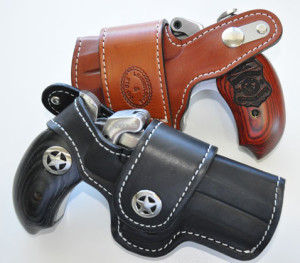 I received two models for testing, a .45 Colt/.410 shotgun Ranger II model with 4.25” barrels that weighs 23.6 ounces and a special edition Border Patrol model called a Border Defender in 9mm with 3” barrels that weighs 22.4 ounces. Trigger pulls on both models run in the 5.5 pound range. Both pistols came with very, I mean very, nice holsters designed as driving holsters because they can be quickly attached to the belt in a cross-draw position by means of a leather strap with a Velcro closure. In this position the pistol is set up for easy access with the right hand and is very comfortable. If you’re tired of a gun butt poking you in the ribs or not being able to access your pistol while you’re driving (pocket or ankle holster) these Bond Arms guns in their driving holsters are the perfect solution.
I received two models for testing, a .45 Colt/.410 shotgun Ranger II model with 4.25” barrels that weighs 23.6 ounces and a special edition Border Patrol model called a Border Defender in 9mm with 3” barrels that weighs 22.4 ounces. Trigger pulls on both models run in the 5.5 pound range. Both pistols came with very, I mean very, nice holsters designed as driving holsters because they can be quickly attached to the belt in a cross-draw position by means of a leather strap with a Velcro closure. In this position the pistol is set up for easy access with the right hand and is very comfortable. If you’re tired of a gun butt poking you in the ribs or not being able to access your pistol while you’re driving (pocket or ankle holster) these Bond Arms guns in their driving holsters are the perfect solution.
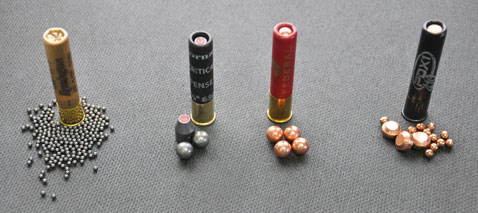 One of the more intriguing features of the Bond guns is the capability of shooting either a .410 shotgun round or a .45 Colt handgun round in the same rifled barrels. Both calibers are available in a wide range of bullet designs, making this combination the hands down choice if you are looking for versatility. .410 ammo is available in shot loads, good for snakes and other vermin, as well as buckshot, slug and several purpose built defensive loads, while .45 Colt ammo can be had in everything from mild Cowboy loads to some really heavy duty hunting loads I’m not sure I would want to shoot in a small pistol.
One of the more intriguing features of the Bond guns is the capability of shooting either a .410 shotgun round or a .45 Colt handgun round in the same rifled barrels. Both calibers are available in a wide range of bullet designs, making this combination the hands down choice if you are looking for versatility. .410 ammo is available in shot loads, good for snakes and other vermin, as well as buckshot, slug and several purpose built defensive loads, while .45 Colt ammo can be had in everything from mild Cowboy loads to some really heavy duty hunting loads I’m not sure I would want to shoot in a small pistol. 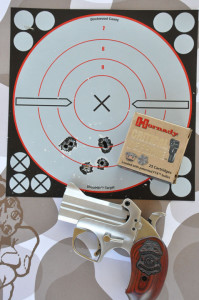 I had a variety of 9mm defensive ammo from Hornady and DoubleTap on hand, as well as some DoubleTap .45 Colt, but lacking .410 shells I wandered down to the local gun store, Tombstone Tactical (hey, we’re in Arizona) and found Federal #8 birdshot and 000 buckshot, Winchester PDX and Hornady Critical Defense ammo. With the popularity of .410 pistols (Taurus Judge, S&W Governor and, of course the Bond guns) the ammo makers are producing defensive.410 ammo designed for pistols and these loads are excellent examples of what’s available. The Federal 000 buck load consists of four copper plated buckshot, the Critical Defense load includes a lead bullet and two lead balls and the PDX load has three copper disks and 12 copper plated BBs.
I had a variety of 9mm defensive ammo from Hornady and DoubleTap on hand, as well as some DoubleTap .45 Colt, but lacking .410 shells I wandered down to the local gun store, Tombstone Tactical (hey, we’re in Arizona) and found Federal #8 birdshot and 000 buckshot, Winchester PDX and Hornady Critical Defense ammo. With the popularity of .410 pistols (Taurus Judge, S&W Governor and, of course the Bond guns) the ammo makers are producing defensive.410 ammo designed for pistols and these loads are excellent examples of what’s available. The Federal 000 buck load consists of four copper plated buckshot, the Critical Defense load includes a lead bullet and two lead balls and the PDX load has three copper disks and 12 copper plated BBs.
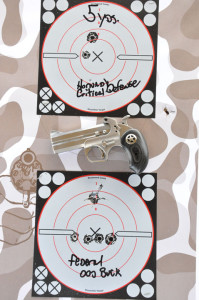 At the range I appreciated the large, oversize stocks on these pistols. They are made wide to distribute recoil into the palm of the hand and the cut-out on the bottom provides a pinky finger rest that helps lock the pistol in the hand and keeps it from shifting or rolling when the gun is fired. I recommend shooting these pistols with a strong, two-handed grip with the thumbs locked down, cocking the pistols with the support hand thumb. I also discovered it’s best for me to sink my finger in on the trigger, as it’s much easier for me to press the trigger with a good amount of finger wrapped around it than trying to do it with my fingertip. Shooting like this, even the heavier loads were comfortable to shoot.
At the range I appreciated the large, oversize stocks on these pistols. They are made wide to distribute recoil into the palm of the hand and the cut-out on the bottom provides a pinky finger rest that helps lock the pistol in the hand and keeps it from shifting or rolling when the gun is fired. I recommend shooting these pistols with a strong, two-handed grip with the thumbs locked down, cocking the pistols with the support hand thumb. I also discovered it’s best for me to sink my finger in on the trigger, as it’s much easier for me to press the trigger with a good amount of finger wrapped around it than trying to do it with my fingertip. Shooting like this, even the heavier loads were comfortable to shoot.
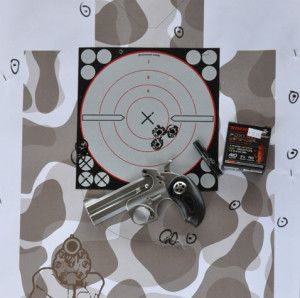 Considering the defensive use of these pistols I fired them at 5 yards. The 9mm Border Defender was mild shooting and easy to shoot well with the defensive hollow points. I discovered the fixed sights were close enough to point of aim and the two barrels printed groups a couple of inches apart. I started firing the Ranger II with #8 birdshot and found the pattern of the shot spread to about 3 feet by 3 feet. Shooting closer at a stick (you can never find a rattlesnake when you need one…) on the ground the pattern was still pretty big but the shot did a number on my field expedient snake.
Considering the defensive use of these pistols I fired them at 5 yards. The 9mm Border Defender was mild shooting and easy to shoot well with the defensive hollow points. I discovered the fixed sights were close enough to point of aim and the two barrels printed groups a couple of inches apart. I started firing the Ranger II with #8 birdshot and found the pattern of the shot spread to about 3 feet by 3 feet. Shooting closer at a stick (you can never find a rattlesnake when you need one…) on the ground the pattern was still pretty big but the shot did a number on my field expedient snake.
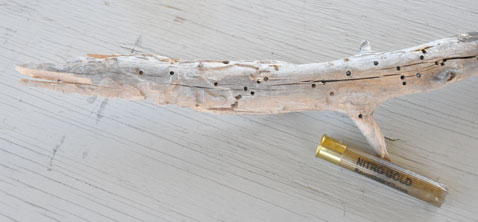 The buckshot, PDX and Critical Defense loads all produced satisfying results and I’m reasonably certain they would fulfill their intended purpose as defensive rounds. While the Bond Arms pistols are a tad slow on the second shot I seriously doubt any bad guy would be standing around waiting for a second helping after getting hit with any of the .410 defensive loads. I finished up my range work with a couple of DoubleTap’s .45 Colt loads, either of which would be effective in defending against man or beast.
The buckshot, PDX and Critical Defense loads all produced satisfying results and I’m reasonably certain they would fulfill their intended purpose as defensive rounds. While the Bond Arms pistols are a tad slow on the second shot I seriously doubt any bad guy would be standing around waiting for a second helping after getting hit with any of the .410 defensive loads. I finished up my range work with a couple of DoubleTap’s .45 Colt loads, either of which would be effective in defending against man or beast.
I chronographed these loads and I’m glad I did because I discovered something I didn’t expect. Shot to shot variations in velocity are attributable to a couple of factors having to do with ammo and the quality of the chamber and barrel. When I chronographed these loads I was amazed to find many of them displayed variations of as little as 3 to 5 feet per second (fps) between shots. This speaks very well to the quality of the ammunition tested but also to the unexpected consistency between two barrels – proving to me that Bond Arms does an extraordinary job in producing consistent, superior barrels. Here are the results I recorded:
9mm
- DoubleTap Tactical 77gr, actual velocity,1348fps, published velocity, 1425fps
- DoubleTap Tactical 165gr, actual velocity, 887fps, published velocity, 900fps
- Hornady Critical Duty, 135gr, actual velocity, 1068fps, published velocity, 1015fps
- Hornady Critical Defense, 115gr, actual velocity, 1128fps, published velocity, 1140fps
.45 Colt
- DoubleTap Tactical 160gr, actual velocity, 633fps, published velocity, 970fps
- DoubleTap Hunter 255gr, actual velocity 644fps, published velocity, 900fps
.410
- Hornady Triple Defense, actual velocity 777fps, published velocity, 750fps.
- Federal .410 Handgun, actual velocity 725fps, published velocity, 850fps
- Winchester PDX, actual velocity 680fps, published velocity 750fps
These pistols exceeded my expectations in all respects. They are attractive, very well made and fun to shoot. Gordon Bond told me they have customers who own a dozen or more of their pistols and I am beginning to understand the attraction. If you haven’t experienced shooting a Bond Arms pistol I recommend you give it a try – you might be as surprised as I was.
For more information:
www.bondarms.com
www.hornady.com
www.federalpremium.com
www.doubletapammo.net
www.winchester.com
About the Author: 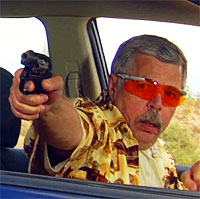 Ed Head is a regular on Shooting Gallery, Gun Stories and Down Range TV. He has worked for almost 30 years in law enforcement, first in the United States Air Force and then with the United States Border Patrol, retiring as a Field Operations Supervisor. During his Border Patrol career, Ed worked in a variety of patrol, investigative and training capacities. Ed has an extensive background as a firearms instructor, having trained thousands, ranging from beginners to police, military and special operations personnel. Having taught at Gunsite for 20 years, Ed first trained there under the world famous shooting school’s founder, Jeff Cooper, then later ran the school as the operations manager for more than five years. Ed lives in Chino Valley, Arizona, where he continues to teach and write.
Ed Head is a regular on Shooting Gallery, Gun Stories and Down Range TV. He has worked for almost 30 years in law enforcement, first in the United States Air Force and then with the United States Border Patrol, retiring as a Field Operations Supervisor. During his Border Patrol career, Ed worked in a variety of patrol, investigative and training capacities. Ed has an extensive background as a firearms instructor, having trained thousands, ranging from beginners to police, military and special operations personnel. Having taught at Gunsite for 20 years, Ed first trained there under the world famous shooting school’s founder, Jeff Cooper, then later ran the school as the operations manager for more than five years. Ed lives in Chino Valley, Arizona, where he continues to teach and write.

